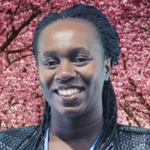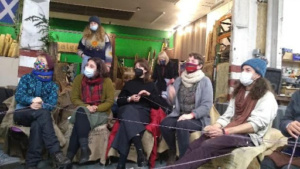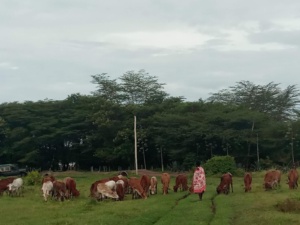|
Host Institute |
|
|
 |
Topic |
The politics of uncertainty and adaptation to climate change in Kenya |
|
Supervisors |
Lyla Mehta, Lars Otto Naes |
|
| Secondment 1 | University of Vermont/Swarthmore College
|
|
|
Mentor |
Ingrid Nelson/ Giovanna Di Chiro |
|
| Secondment 2 | University of Oslo | |
|
Mentor |
Andrea Nightingale |
|
| Fieldwork
|
Kenya and Tanzania | |
|
After graduating with a BSc (2006) from Kenyatta University and in the course of pursing an MBA from JKUAT (2012), Eunice worked for a Kenyan bank as a micro finance officer. Later on at a local NGO, she trained female household heads on climate smart agriculture. In 2016, she enrolled for an MSc Environmental Sciences at Wageningen University and Research. She majored on Sustainable Development Diplomacy and policy which links theory to practice. She conducted a horizon scan for the UN Division for Sustainable Development and wrote a policy brief that fed into their 2017 High Level Political Forum and published on their website. She was a visiting scholar at the Fletcher School of Law and Diplomacy and the Harvard Kennedy School in USA. Here she analysed how definitional conceptualization of additionality informs financing decisions by adaptation funds. The abstract of the research was presented at the 2018 Adaptation Futures Conference. |
||
Objectives of the research
Impacts of climate related shocks and stressors such as droughts, floods as well as changing patterns of rainfall and temperature are characterised by uncertainty, particularly at local levels. In policies and strategies, uncertainty is usually conceptualised by experts who tend to rely on climate scenarios and risk assessments. We still know little about whether and how these conceptualisations translate appropriately to the local level or whether they reflect local gendered lived experiences of climate related uncertainty. Women and men experience climate change related uncertainties differently, ranging from women often being left to be primary carers of the family after men migrate in the wake of cyclones and floods, to the increasing burden experienced by women around care and life sustaining activities such as accessing water, sanitation and health services in environments characterised by ecological uncertainty. The ESR will examine how gendered differences in experiences, strategies and knowledges of climate-related uncertainties of communities can inform policies and strategies for adaptation or mitigation.
Expected Results
Studies in Kenya on the gendered knowledges and strategies deployed by women in dealing with climate-related uncertainties, as well as how such gendered perspectives and alternatives can be built into official responses and strategies to climate change. The analysis will be used to consider the climate change adaptation goals as reaffirmed through the Paris Agreement, as well as supporting gender equality as set out in the SDGs.
Progress update
In 2020 Eunice conducted fieldwork and collected data in in the Mara region of Narok County. She carried out semi-structured interviews, focus group discussions and life history narratives. The collection of data was cut short by the confirmation of COVID-19 in the country, that resulted in restrictions of meeting face to face. Nevertheless, she was able to clean out the data she had collected so far, with the purpose of identifying key themes to write her dissertation on and find any gaps that may need further data collection. She attended the WEGO-ITN training lab in June, the POLLEN 20 conference in September and write-shop in October, as they were moved online. She also co-authored a journal article on the political ecology of the COVID-19 pandemic which was submitted to the Frontiers of Political Ecology Journal which will be published in 2021.
Publications by Eunice Wangari
Forthcoming:
Blogs by Eunice Wangari

FPE Dialogues UK – a look into frontline communities and the multiple faces of extractivism

Gender and climate change adaptation responses in Kenya


